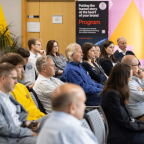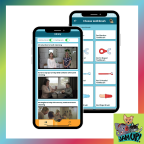
University of Exeter: Optimising supply chains with machine learning
A new Knowledge Transfer Partnership (KTP) between the University of Exeter and Applegate Marketplace launched this year to help machine learning improve the company’s decision-making.
With support from IIB’s dedicated KTP team, data scientist Aimée Hall is now working closely with the procurement firm Applegate, whose AI-based platform aims to optimize the process of matching buyers with suppliers.
The project builds on 5 years of collaboration between Applegate and the University of Exeter, initially driven by discussions between Applegate CEO Stuart Brocklehurst and IIB’s Isabel Gonzalez. Since then, the work between Applegate and the University of Exeter has led to a case study for the REF 2021 submission, an ongoing EPSRC grant application, and introductions between new businesses and the Institute for Data Science and Artificial Intelligence (IDSAI).
What is a KTP?
Knowledge Transfer Partnerships – otherwise known as KTPs – are collaborative projects between a business and a university, facilitated by a high-calibre graduate. They aim to address business needs with technical expertise, by developing new products and services, embedding new technologies or solving sustainability challenges, for example. They last between 18 months and three years and are co-funded by the UK’s innovation agency, Innovate UK.
Most recently during the pandemic, the collaboration developed the Covid-19 Supply Hub, which has now matched buyers with suppliers of over one billion items of PPE. The success of this project led to Applegate CEO Stuart Brocklehurst applying for a Knowledge Transfer Partnership.
Following the project’s promising early progress, we reached out to Aimée – the KTP’s Associate – to find out about her work embedding machine-learning into the company’s decision-making platform.
Could you tell us about the focus of your KTP with Applegate?
Aimée: “The idea of the KTP project is to embed machine learning within the company, so that it complements staff decision making. By designing a machine learning tool that can work out the most likely suitable suppliers to invite to a buyer request, it greatly increases the volume of requests that the company can process. This itself frees up staff time for more interaction with buyers or suppliers as needed – be it for more complex requests or to answer any customer questions.
“The benefit of a KTP is that, as well as gaining the expertise of University staff, the company gains a staff member who can be responsible for the initial development and ongoing usage of the machine learning in the company. This helps with things such as understanding buyer, supplier and staff needs, as well as facilitating knowledge transfer to and from other staff members, both during and beyond the KTP.”
What are some of the project’s early successes and applications, at this stage?
Aimée: “While undertaking a broad review of the existing buyer-supplier matching process, we already identified quick wins even before getting to the machine learning aspect, including redesigning user interfaces to make the process more intuitive for staff as well as clients.
“We are gaining a greater understanding of what makes a good supplier-buyer match, and how to get a machine to account for the staff’s wide-ranging expert knowledge of companies (e.g. specific, preferences, variable demands on time). An initial prototype already suggests that machine learning from past requests can replicate past staff decisions on which suppliers to invite to future requests in some key areas.
“It also links up with another ongoing collaboration between Applegate, The University of Exeter and Ghyston. The project, SupplyDevon, aims to support local communities, reduce carbon impacts and reduce discrimination in the supply chain process, all by encouraging local supply chains.”
How have you found the experience of working with an external organisation in Applegate?
Aimée: “I’ve really enjoyed the experience, thanks to the combination of having inspiring colleagues and an important, challenging problem. It’s a refreshing reminder of how business needs and real-world applications should be accounted for in research, particularly the relative speed at which changes often need to be made compared to a generally slower, longer-term process of academic research.
“I’ve found Applegate colleagues very keen to learn more about how machine learning can help them, at the same time as they teach me which model assumptions do or do not make sense when applied to Applegate’s specific situation.”
What have you most enjoyed about this work?
Aimée: “It’s great to see my work make an impact right from the start, and the experience has encouraged me to think in new ways, come across new ideas and create lasting connections that enrich research. The benefits work both ways: academic thinking and analyses bring new ways of thinking to the external partner, often sparking future innovation.
“From my perspective, the KTP team at IIB have been really helpful in helping me understand the application process, and giving tips about how to make a University-business partnership a success. I have already recommended multiple friends to apply for KTPs, because I think they are the way forward in combining the best of academia and industry!”
For more information about Knowledge Transfer Partnerships with the University of Exeter, contact the KTP team.
This blog was originally shared via the University of Exeter website.







